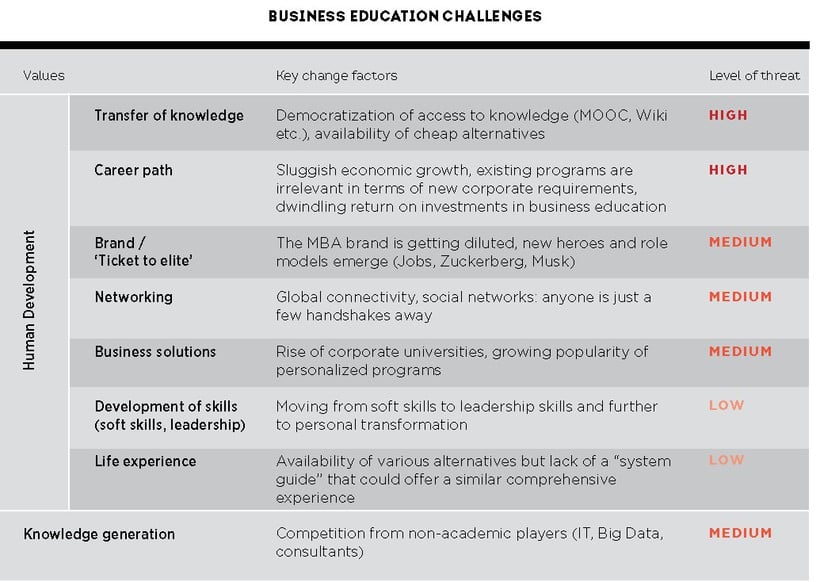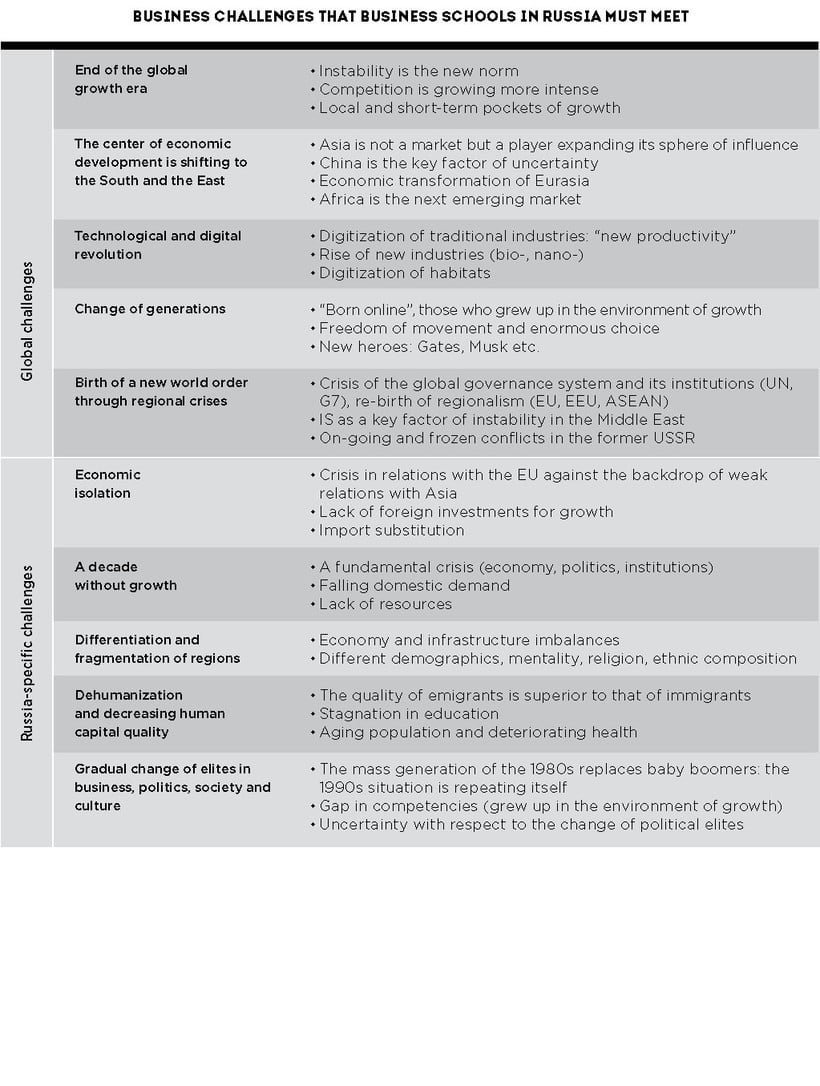A Study of Challenges
The economy is evolving fast, and those business schools that are unable to adapt to these rapid changes and move away from the paradigm of extensive growth and technological revolution face being wiped out. Players in the emerging markets will have to be even more inventive and follow new trends closely.
The global crisis in 2008-2009 was followed by unprecedented criticism levelled at the business education industry. After more than 100 years of dynamic development, creating education formats, programs and brands that were easy for the rest of the world to understand, business schools suddenly found themselves in a situation where they had to radically reconsider their own position in the new environment. With the economic context growing ever more complicated, and against the backdrop of explosive technological progress, accelerated development of new business models, and fundamental shifts in human behavior, the industry could no longer respond to the challenges faced by its core clients.
Facing a Threat
Of course, schools are keeping track of the latest trends and trying to adapt to the ever-evolving context. Today, Harvard, Stanford and MIT are blazing a trail when it comes to developing online courses. Online models in educational programs have become ubiquitous. Every year, the content of flagship curricula is overhauled and emphasis is placed on different areas. Historically, schools have been very efficient at adapting to new challenges and even today traditional market leaders have no problems recruiting students.
Things look quite different in the emerging markets, though. Schools started out in the 1990s by replicating Western models. However, few of them have truly challenged their Western competitors. The list of top 100 MBA programs includes just 13 schools from China, India, Singapore, South Africa and South Korea and only two of them managed to make the top 20. In the meantime, the seven largest emerging economies are now almost as big as G7. Officials from these schools are constantly pondering the strategies to take them forward: should they follow the well-trodden path of rankings, accreditations and standardized programs or develop new models and create unique propositions for their local markets?
To answer this question it is necessary to look at the challenges that will determine the development of business and business education over the next ten years. After all, the history of business education is a history of responding to new market challenges. Having emerged as professional schools to train management specialists, today’s MBA citadels have evolved into complex organisms offering a broad variety of values for managers, companies and the society. Today, nearly all elements of this value proposition are facing serious competitive threats.
Revolution or Evolution?
There are eight key identifiable attributes of business education institutions. Each of them should be examined separately in terms of competitive non-systemic solutions.
Transfer of knowledge – initially, the key function of business schools. The global digitization of knowledge and democratization of access to it caused that knowledge to lose its unique value. Now we are faced with a situation where all knowledge in the world can be accessed by anyone, anywhere and anytime. The recent rise of online courses, and the fact that 25 million people have followed them in the last three years, tells its own story. However, online solutions enable participants to internalize no more than 20% of this knowledge and these solutions alone cannot compete with business schools. They will only be one part of the education process and each school will have to decide the extent to which it wants to be present online while maintaining its traditional role of putting students through individual educational trajectories.
Development of leadership skills and competencies. According to various polls conducted by GMAC, the vast majority of business school alumni believe leadership and communication skills to be the most important outcome of their education – after all, these pre-determine further personal and professional success. Currently, there are no effective online tools that can help to develop these skills: people still learn to become leaders by communicating with other people. It means that non-systemic solutions offer little tangible competition and schools are likely to continue to treat this function as fundamental, even enhancing it in the foreseeable future.
Career path – offered by business schools that operate predominantly based on a model that is simple and easy to understand. People pay them money realizing that these investments will pay off and their graduates will definitely find jobs. However, the falling return on investments into business education (fees are becoming increasingly expensive against the backdrop of stagnating salaries), the dwindling appeal of corporate careers and the sluggish global economy mean that graduates are no longer guaranteed worthwhile employment. This is especially true in the emerging markets, where MBA degrees have always overweighed the potential candidate’s prior experience. This directly affects the appeal of business education– between 2009 and 2014 there was almost no change in the number of students who sat GMAT exams.
Social stratification is also related to the career factor – it is one of the most fundamental functions of the education system as a whole and business schools in particular. In the absence of any other tools to identify the best emerging talents in society it’s reasonable to assume that business schools will continue to fulfill this role. Companies need a place where they can source talented individuals who have already gone through a tough selection procedure and meet certain standards. It means that we will continue to see an ever-growing gap between leading schools and everyone else. Statistics already confirm that only an education obtained from top ten universities makes a big difference in terms of future success in life. When it comes to other universities, graduates achieve more or less the same outcomes over the long run in terms of both positions and remuneration.
Acquiring new connections is reason number five to go to a business school. However, in a globally connected world where people are born with a profile in social networks, the role of “legacy” connections and geography is dwindling fast. Virtually everyone is accessible and it has never been easier to connect for both business and personal reasons. Does all of it mean that an age of introverts is upon us? That’s hard to say – after all, business is built on trust, which is predominantly a function of physical communication. If a new format is found to build a reputation, for example, online, the networking opportunities that business schools offer may lose their appeal and become a thing of the past.
Studies in a business school offer students a unique transformational life experience, which leads them to reinventing themselves and rethinking their personal strategies and life path. This experience can hardly be replicated in a different environment, which is why the number of those applying for MBA and Executive MBA programs remains constant. Today the top ten Executive MBA programs include seven joint degrees that presuppose studies at different schools and in different countries, which guarantees a diverse life experience during the study process. In the future it is likely that non-academic elements of these programs will growth still further and there will be greater emphasis on personal development.
Speaking about the role of business education, it is important to remember that business schools do not just offer programs for private individuals. They also provide solutions for companies. In this respect schools run into serious competition from corporate universities that tend to occupy an ever-growing corporate education market share, and from professional consultants who are closer to the market, less prone to inertia and command more specialized expertise. Competing with these players will not be easy, which is why it is vitally important for schools to develop their own unique expertise in particular industries, functions or regions.
Finally, if a business undergoes rapid changes, managerial thought has to keep pace. In this regard the generation of knowledge becomes one of the most important competitive advantages schools can offer. Historically, business schools have been a place where ideas were born and today those who develop and enhance their own research expertise become recognized leaders. In the future, when knowledge becomes universally available, this advanced expertise and the ability to meet the challenges faced by business and managers will become the decisive factor determining the success of any business school in any market.
Having emerged as professional schools to train management specialists, today’s MBA citadels have evolved into complex organisms offering a broad variety of values for managers, companies and the society. Today, nearly all elements of this value proposition are facing serious competitive threats
What do these challenges mean for business schools and how do they affect their strategy? First off, there is no point in spending enormous efforts trying to maintain a competitive position where it is no longer possible. Nobody can stop the avalanche of changes, we can only adapt to them. That’s why a strong proposition relies more on those elements that are least prone to outside pressure, such as the development of skills, personal transformation and generation of knowledge. In other words the school should not be driven by the process (of knowledge transfer) but rather by the goal (business development and human transformation). In order to achieve this goal more efficiently, the school needs to understand the context and place greater emphasis on the right competencies and areas of knowledge.
What underlies the intellectual agenda?
The ability to meet business needs means understanding the challenges that shape business development in the country in the short and long-term.
Undoubtedly, the key challenge for all companies today is the global economic slowdown. After 50 years of growth predicated on expanding markets, growing populations and replication of successful models we see a paradigm shift whereby extensive growth is replaced by intensive growth. Explosive growth of competition, a struggle for efficiency, unstable economic development and local pockets of growth have replaced predictable consumption and developing markets. Growth leaders produced by yesterday’s business schools are yielding to entrepreneurial leaders who command a completely different set of competencies.

At the same time, it is becoming clear that the South and the East will play an increasingly important role in the global economy and international distribution of labor. Even today, China alone accounts for more than 40% of global economic growth and going forward this country is likely to become the largest economy in the world.
Emerging economies are being transformed from markets into independent players. Even in the past, Old World business schools did not always manage to successfully train specialists for these markets and today, when the price of error is becoming prohibitive, this is even more difficult to accomplish. It means that schools in dynamic economies have a chance to occupy a solid regional position thanks to their understanding of the local context and their connections with businesses on the ground.
The next challenge for the global economy is fast-paced technological progress, which brings about radical changes in business models. In the past technologies were the prerogative of technological companies, but now they have become a vital platform for any business. Do business schools understand it and include it in their curricula? Not all of them do so far. This is why schools in emerging markets have a unique chance to place their stake on technologies and “digital” development as a key component of any program.
We live in a world where an age difference of just 25 years could become an insurmountable obstacle. The disparity between old and young generations living such different lives is one of the key issues for business in today’s world. How are consumer preferences evolving? What motivates managers and employees of different companies? What will the new business elite look like? The leaders of today’s companies are striving to find answers to these questions and business schools can help them with that.

Finally, political risks impose significant restrictions on business development in virtually any country outside of the OECD. As a result of the UN’s de facto inability to ensure global security, regional conflicts and the unpredictable foreign policy agenda, businesses in developing countries are reluctant to opt for long-term investments and favor short-term planning horizons.
Russia presents a typical example of how political factors can radically change the local context – today the country is faced with economic isolation as a result of financial sanctions that have been introduced against it. Just one year of unfavorable political and economic conditions has replaced more than a decade of fast-paced growth with recession, capital flight, a crisis of confidence and imbalances in regional development, which both the government and businesses will have to respond to. Combined with the decreasing quality of human capital and the impending change of elites, this will lead us to a totally new context, which dictates that Russian business schools should adopt a different research and education agenda.
Each emerging market is unique and has its own set of challenges. Business schools can only gain a competitive advantage over leading international players by building an intellectual agenda based on a own responses to these challenges. How can this be ensured? Through closer integration with business, developing applied research focusing on key topics, and training leaders with management competencies who are capable of operating in a highly uncertain risk environment.
Strategic Choice
Business education will remain a sought-after commodity as long as business itself exists. However, very soon we may see business schools gradually ceding their place on the market to alternative solutions, which will precipitate them into proactively rebuilding their models and propositions to clients.
 Today we can already imagine a wide range of these new models: from education platforms and online universities to personal development boutiques and corporate universities. However, the model they choose is not as important as these schools’ intellectual position in the future ecosystem.
Today we can already imagine a wide range of these new models: from education platforms and online universities to personal development boutiques and corporate universities. However, the model they choose is not as important as these schools’ intellectual position in the future ecosystem.
We can already start trying to map the contours of this ecosystem based on two parameters that directly affect any business school’s position: its attitude to technologies (how to teach?) and its intellectual agenda (what to teach?). Depending on how different schools find answers to these challenges we can anticipate how they might be grouped around the following four key categories:
Premier League – schools that have enough resources at their disposal to generate advanced knowledge and at the same time remain leaders in education technologies. It appears that there will be very few of them left and it is highly unlikely that any new schools of this kind will appear in the emerging markets.
Good enough – schools that successfully replicate functional educational formats at a regional or global level falling back on existing proven technologies and offering their students an acceptable level of basic managerial knowledge and skills. Today, most schools in emerging markets are striving to join this group, in particular replicating successful and proven models.
The same but different – schools in this category tend to stake heavily on technologies and resort to innovative approaches to education but, at the same time, they do not claim to offer any unique program content. There is enormous growth potential in this segment, but so far there is no functional model that can be expanded right up to a global level.
Intellectual leaders – schools that apply state-of-the-art technologies in a rational way and see their competitive advantage in their unique program content and an individual make-up that is based on in-depth understanding of specific industrial, functional or regional contexts. As a rule, this model is selected where resources are limited and these schools are unable to compete with global players when it comes to technological solutions and platforms. There are already schools in emerging markets that occupy competitive regional positions and focus on the characteristic challenges of a specific country (for instance, CKGSB in China, SKOLKOVO in Russia and FDC in Brazil).
Currently it is not possible to say that any of the strategic options outlined above would be more or less suitable or attractive, especially given the dynamic environment of emerging markets. Each of them offers certain opportunities and certain challenges, and requires special positioning and resources. What can be said for certain, however, is that the business education industry is going through a very interesting time where much more is required of these schools and the knowledge, solutions and program they offer. These requirements cannot be met using old models, which means that new formats will have to be found and these schools will have to follow business and the issues it faces.












